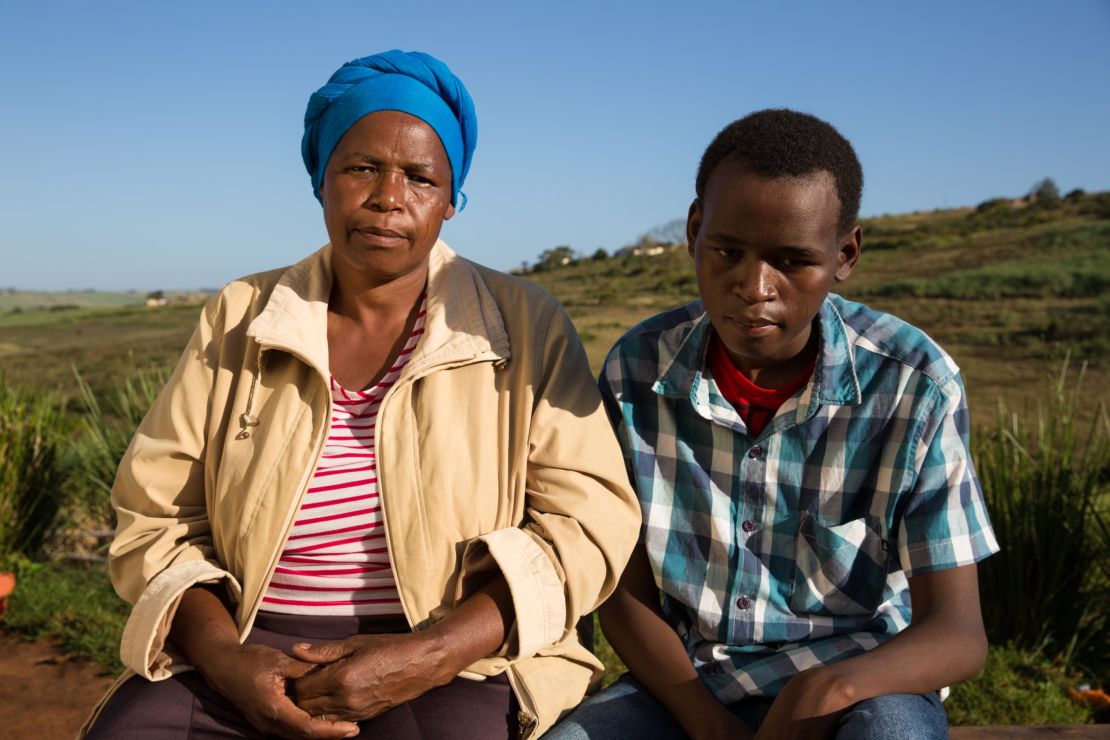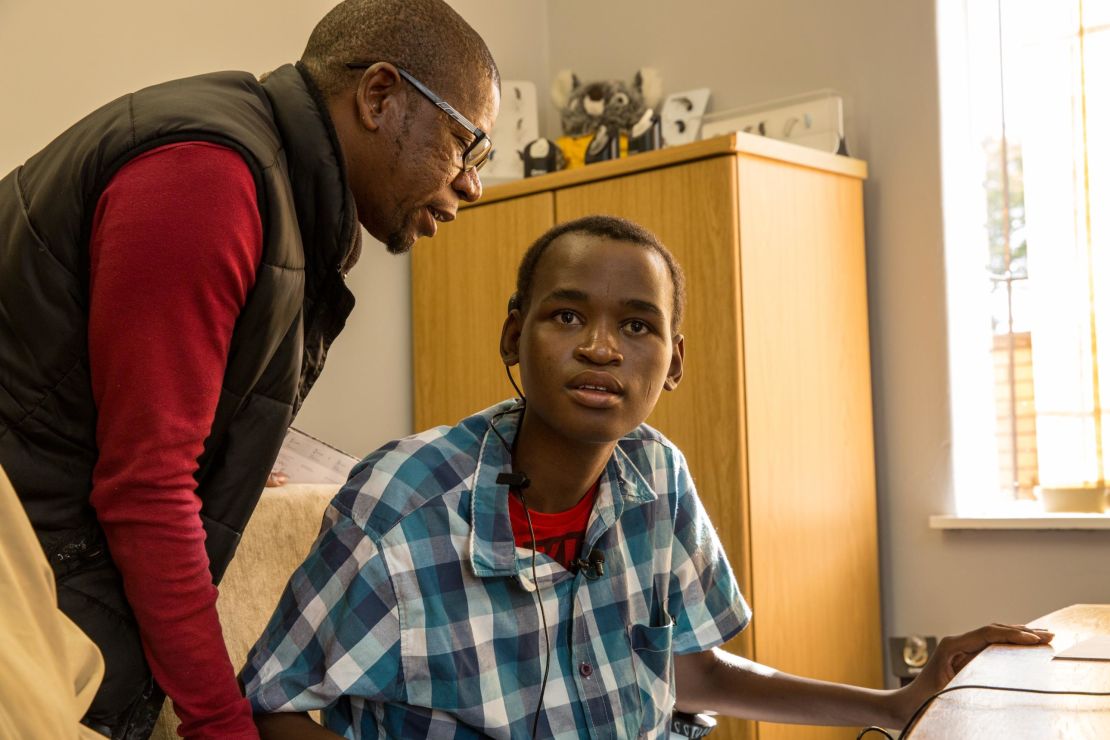Story highlights
World Health Organization recommends certain injectable antibiotics to treat drug-resistant TB
Studies show that up to 60% of patients who receive them lose their hearing
The South African government, outside groups are trying less-toxic drugs
The terror crept over Khumbulani Shandu.
Lying in his hospital bed, he knew that something was very wrong. The world was rapidly closing off to him. He could hear muffled, indistinct sounds coming from doctors at thehospital in KwaZulu-Natal, South Africa but he couldn’t quite make out what they were saying.
Just 14 years old, Khumbulani was rapidly going deaf.
“I just couldn’t understand the sound. I just couldn’t understand. It was the most difficult thing in my life,” he said.
Then, the sound all but stopped.
Khumbulani had contracted tuberculosis from his father at their rural homestead in 2016. But first-line drugs didn’t work, and he embarked on a painful and difficult treatment for drug-resistant TB.
For months, his doctors prescribed a highly toxic injectable antibiotic called kanamycin along with a cocktail of other drugs to attack Khumbulani’s infection.
But the injectable that was meant to cure him had made him deaf.

A terrible choice
Many thousands of patients with multidrug-resistant tuberculosis have had to make the horrific choice between potential deafness or death.
This level of resistance means the bacteria that cause the infection are resistant to being treated with at least two of the most powerful anti-TB drugs: isoniazid and rifampin.
For decades, the World Health Organization has recommended a select range of injectable antibiotics to treat the infection, despite studies showing that up to 60% of patients who receive them lose their hearing.
It’s a choice that nongovernmental organizations like Medecins Sans Frontieres (Doctors Without Borders) say they shouldn’t have to make. They have been campaigning for several years for the availability of safer drugs.
Now, the South African government is taking a stand.
Starting this month, it will roll out a newer, less toxic drugs to all patients with drug-resistant TB, moving beyond WHO guidelines, which have yet to endorse use of the drugs.
In making the announcement, the South African Department of Health said real world data showed a significant increase in treatment success and far less adverse side affects for patients.
“All governments should make it possible that the patients that need this new medicine should access it. It is very important. Globally, the speed of uptake is ridiculously unacceptable. I think we can do better,” said Dr. Norbert Ndjeka, the head of South Africa’s drug-resistant TB program.
A killer of the poor
There is no doubt TB is a major public health risk.
An infectious disease mostly affecting the lungs, TB can be particularly difficult to treat, and drug-resistant strains are on the increase.
South Africa’s burden of the airborne disease is particularly high, as a high incidence of HIV has worked hand in glove with drug-resistant TB, weakening immune systems to make people more susceptible.
More than 430,000 people were infected with TB in South Africa in 2016, and more than half of them were also HIV-positive. Of the 123,000 deaths from TB, 100,000 also had HIV.
“This is a crisis,” said Dr. Anja Reuter of Medecins Sans Frontieres, who deals with drug-resistant TB patients every day in the group’s clinic in Khayelitsha, near Cape Town.
Killing about 1.7 million people each year, TB is one of the globe’s biggest threats. But more than 95% of the cases and deaths are in developing countries.
“A lot of people who have TB don’t have a lot of money to spend on drugs. So it is not a great investment for pharmaceutical companies,” Reuter said.
Medecins Sans Frontieres wants thetoxicinjectable agent replaced with drugs like bedaquiline and delaminid, which it believes are far more effective, based on field experience with thousands of patients.
The organization’s doctors see bedaquiline as a particularly effective substitute for the injectable agents. Developed more than 10 years ago, the drug was approved in 2012 by the US Food and Drug Administration.
They welcomed the South African government’s announcement, but highlighted the need for them to support health facilities in developing capacity to use bedaquiline and other new drugs, and for manufacturers to reduce the prices they charge in South Africa and globally.
TB experts like Ndjeka believe that the long dependency on toxic TB treatment – slowed by market forces and a lack of political will – is an example of how so-called diseases of the poor are neglected.
But TB drug development, along with other diseases of its kind affecting the poor, is stuck in a catch-22.
Clinicians and policy-makers say that drugs won’t get approved unless they have gone through substantial trials, but drug companies don’t want to pay for development unless they know there is a market.
One of the very few phase two trials of bedaquiline had problematic results and is disputed by many in the TB community. But public health officials say the biggest issue is a lack of will.
“TB hasn’t been prioritized by industry because there is very little incentive. It is not a money-making business for them, and there is very little return on their investment,” said Dr. Karin Weyer, the coordinator of WHO’s Global TB Programme Unit for Laboratories, Diagnostics and Drug Resistance.
“At the WHO, we need to walk a fine line of not prematurely recommending a drug,” she said, denying that there has been any delay in drug rollout and instead citing inconclusive trial results for newer drugs.
Medecins Sans Frontieres is now leading a global trial of the newer drugs. But definitive results could take years.
Some clinicians have argued that new drugs shouldn’t be rushed out, because they could cause more resistance in the notoriously adaptable disease.
Reuter finds the approach deeply unethical. “We need to respond to the crisis now, the people in front of us now, the people who need good drugs now, whose hearing needs to be preserved now.”
Finding a voice
Another factor pushing faster rollout: Patients have found their voice.
In 2010, Phumize Tisile was diagnosed with extensively drug-resistant TB, a form of the disease that is resistant to the four main groups of drugs used to treat it. Combating it can take years and requires further alternative drugs with even more side effects.
Tisile had to drop out of college and start the intensive treatment, which included injectable antibiotics.

“You take the injection, and then you hope that you are going to get cured. The next thing you know, you wake up, and you are deaf,” she said. “It is possibly the worst thing that can happen to any person.
“You get a ‘sorry,’ but sorry isn’t good enough.”
Phumize was cured, but her hopes for the future were extinguished. For five years, she was cut off from the world by her deafness.
She started blogging and campaigning for better treatment. She contributed to a manifesto calling for a better life for drug-resistant TB patients.
“For every person with DR-TB who signs this manifesto, there is another person who is no longer able to. The demands we make in this manifesto are therefore made in honor of their memory,” it reads.
Finally, Phumize read about cochlear implants, electronic devices that can help certain people with hearing loss, and raised enough money to get the device. She is now back in college.
Turning on to the world
Until the government’s announcement, South Africa was already giving bedaquiline to patients who started developing hearing side effectsat Medecins Sans Frontieres and government clinics – a move sanctioned by WHO.
But for Khumbulani and many others, it was too late.

Khumbulani was destined to hear nothing but silence, but an anonymous donor heard his story and stepped in.
Cochlear implants are expensive and unrealistic without private health insurance or extensive government backing. In South Africa, only two provinces offer it in the public sector. Far better, clinicians say, to avoid the deafness in the first place.
“Every day working in this province in the state system, they see patients with acquired deafness as a side effect of TB treatment,” said Dr. Kurt Schlemmer, a surgeon based in Kwa-Zulu Natal.
He says hearing aids won’t work, because the injectable agents destroy the inner workings of the cochlea.
Follow CNN Health on Facebook and Twitter
“A hearing aid could make any sounds louder, but Khumbulani wouldn’t be able to understand them,” he said.
During the consultations, he said, Khumbulani didn’t communicate at all.
Schlemmer installed Khumbulani’s cochlear implant a few weeks ago. The implant replaces the tiny hairs in the cochlea that were destroyed by the toxic medicine with electronic signals.
Turning the device on for the first time, Schlemmer carefully placed the processor of the implant on the side of Khumbulani’s head.
“Khumbulani! Khumbulani! Khumbulani!” the audiologist said as she increased the device’s volume from her laptop.
A realization crossed his face – it’s like Khumbulani’s soul is switching on. He immediately started talking and talking.
Says his mother, who is in the room, “we have hope now.”





